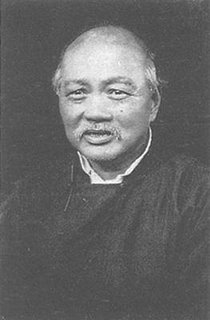Cheng Man-ch'ing: 1947 Thirteen Chapters Frontpiece

Many practioners of Cheng's taichi may have wondered about the men whose names Cheng mentions in his articles, and the authors who offered Dedications and cover calligraphy to adorn his books. On the whole, none of these men were taichi practioners, but rather polticians, scholars, and Koumingtang elite.
As no translator of Cheng's Thirteen Chapters, authorized or otherwise, has yet to provide any information on these Dedications and cover art, I took it upon myself to research the subjects and compose a monograph that deals solely with the various Dedications and calligraphic Frontpieces to all of Cheng's works. Excerpts from this article will be posted occasionally.
Today I present the frontpiece calligraphy from the first edition of Cheng's Thirteen Chapters.
This calligraphy to Cheng's 1947 first edition of his Thirteen Chapters was written for Cheng by Wu Ching-heng. There is little connection between the book's subject and Wu, and Cheng's choice seems to be politically motivated.Wu was not only one of the founders of the Republic of China, and a self-proclaimed anarchist--but also a noted essayist, and a famous calligrapher.

Wu Ching-heng 吳敬恆 (March 25, 1865 - October 30, 1953), born Wu Tiao 朓, having the courtesy name Chih-hui (稚暉) was a specialist in linguistics and philosophy. He was the chairman of the 1912–13 Commission of the Unification of Pronounciation which created the chiyin fuhao, or "symbols for annotating sounds," and known by every student of Chinese as bopomofo, a name excerpted from the first four symbols. He became the first Academic Scholar of the Humanity Division (人文組院士) of the Academia Sinica and a representative in the National People's Delegate Conferences (國民大會).
As a respected calligrapher, the symbols he created for the chuyin fuhao contain strokes bearing the essential elements of calligraphy.
His publications can be found in The Collected Works of Mr. Wu Chih-hui 《吳稚暉先生集》

0 Comments:
Post a Comment
<< Home